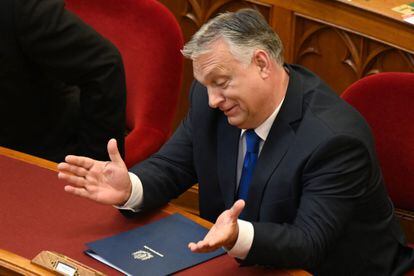Hungarian Prime Minister Viktor Orbán, moments before the inauguration ceremony of the new government, this Tuesday in Budapest. ATTILA KISBENEDEK (AFP)
It has all happened in a matter of hours.
The supermajority of Fidesz, Viktor Orbán's ultra-conservative party, approved on Tuesday the tenth reform of the Hungarian Constitution to introduce the possibility of declaring a state of emergency in the event of war or humanitarian crisis in a neighboring country.
Then, after being sworn in, Orbán's new Executive, who won the elections on April 3, took office.
To end the afternoon and close the circle, the prime minister has announced his first measure: he has declared a state of emergency due to the war in Ukraine, which allows him to rule by decree.
More information
The war in Ukraine, live
Orbán has assured that the objective of declaring the state of emergency – which further strengthens the powers of his Government, although he already has an overwhelming majority in Parliament – is “to safeguard Hungary's national security interests”.
"To make sure that we stay out of the war and to protect Hungarian families, the government needs to have room for maneuver and be ready for immediate action," said the populist and illiberal leader in a video posted on Facebook, in which announced that the first measures will be announced this Wednesday.
The war in Ukraine, according to the Hungarian Prime Minister, "represents a constant threat" and puts "the physical security" of the country at risk, in addition to the "energy supply and financial security of the economy and families".
"The world is on the verge of an economic crisis," he added in his message, in which he alluded to the rise in prices caused by the conflict and "Brussels sanctions."
Inflation is running at 9.5% annually in Hungary and the deficit has risen in the first quarter, according to Reuters, due to Orbán's spending before the elections, with an injection of almost 5,000 million euros for families and pensioners.
Hungary was already living in a state of emergency, declared by the covid-19 pandemic, for two years.
The measure expired, however, on May 31.
At the beginning of the month, the Minister of Justice, Judit Varga -the only woman among the 14 ministers of the new Cabinet-, presented to Parliament the amendment of the Basic Law that allows declaring this exceptional measure for other cases related to the war.
With 136 votes in favor versus 36 against, the tenth constitutional reform that allows the Government to activate it due to "armed conflicts, war or humanitarian disaster in a neighboring country" has gone ahead.
In 2015, Orbán also declared a state of emergency due to the influx of refugees, mainly from the Syrian war.
Orbán inaugurates his fourth consecutive legislature and the fifth in his career with the swearing-in of his government on Tuesday.
In the April elections he obtained a historic result that consolidates his majorities of more than two-thirds in Parliament.
The opposition and civil society denounce the authoritarian drift of the prime minister and that since he came to power in 2010 he has concentrated all power in the hands of people close to Fidesz.
The European Commission has had several disputes with Budapest at the cost of the degradation of the rule of law, especially due to corruption in the management of European funds and judicial independence.
The Orbán government, a historical ally of the Kremlin, had supported European sanctions against Moscow until now.
His refusal to veto the import of Russian crude oil and gas, on which he is extremely dependent, has blocked the approval of the sixth package of sanctions for the time being.
The European Council next week was scheduled to address the issue again, but Orbán has asked not to include it on the agenda because, he says, it is unlikely that they will reach an agreement by then.
His government argues that it needs millionaire investments to achieve independence from Russian energy.
Hungary's position on the war has cost it an alienation from Poland, its closest partner in the EU, which sees it as pro-Putin.
Budapest has condemned the Russian invasion, but refuses to send weapons to Ukraine or allow weapons sent by other countries if they have to transit through its territory to reach Ukraine.
To try to silence criticism, she always insists on the effort she makes to receive refugees, although 80% of those who enter her territory do so to continue on to another country.
Follow all the international information on
and
, or in
our weekly newsletter
.

